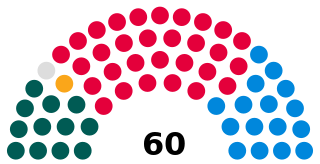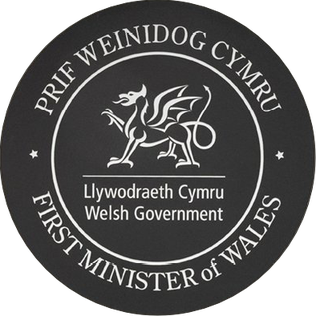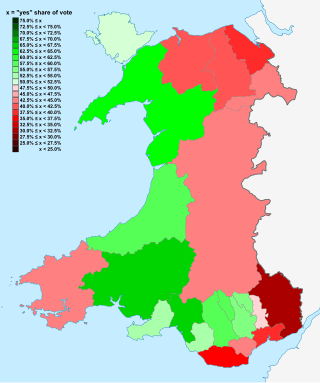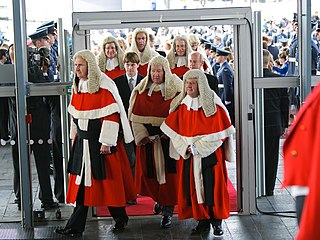
The Parliament for Wales Campaign (Welsh: Ymgyrch Senedd i Gymru) was a political campaign for a Welsh parliament (also known as a "Senedd") of elected representatives in Wales. This campaign was also known as a "Campaign for a Welsh Assembly".

The Parliament for Wales Campaign (Welsh: Ymgyrch Senedd i Gymru) was a political campaign for a Welsh parliament (also known as a "Senedd") of elected representatives in Wales. This campaign was also known as a "Campaign for a Welsh Assembly".

Those in favour of a Welsh parliament paraded in Machynlleth (the place of Owain Glyndŵr's last Senedd) on 1 October 1949. Speakers and entertainment were also at the event. [1]
From 1950-to 1956, Parliament for Wales Campaign brought devolution back onto the political agenda. A cross-party campaign was led by Lady Megan Lloyd George, daughter of former Prime minister and campaigner for Welsh devolution, David Lloyd George who had passed away in 1945. [2] [3] The Campaign for a Welsh parliament (Ymgyrch Senedd i Gymru) was formally launched on 1 July 1950, at a rally in Llandrindod. This event lead to the creation of a petition of 240,652 names calling for the establishment of a Welsh parliament, which was presented to the House of Commons by Megan Lloyd George in 1956. [1] This was rejected by the UK government. Petitions were also presented to the House of Commons for a Secretary of State for Wales which were also rejected. Following the pressure for a Welsh parliament, the UK government instead formed the Council for Wales and Monmouthshire in 1948 as an advisory body to the UK government composed of UK government-appointed members, but no elected members. [2] [3]
The Campaign for a Senate was set up following the 1987 general election and the Campaign for a Welsh Assembly (Ymgyrch dros Senedd i Gymru) was officially launched in Merthyr Tydfil on the 26th of November 1988, following multiple meetings in Wales the previous year. Their activities were conducted bilingually. The name of the organisation was changed in 1993 following the recommendation of the National Council to The Parliament for Wales Campaign (Ymgyrch Senedd i Gymru) and remained a cross-party, non-partisan organisation with the aim of gaining support for an elected and legislative Parliament for Wales. In March 1994, the Campaign held a two-day democracy conference in Llandrindod which was attended by 250 people including political parties, churches, local authorities, and trade unions. The campaign prepared questionnaires and petitions and also placed advertisements in newspapers calling for devolution to Wales. Following the establishment of the National Assembly for Wales in 1998, the Parliament for Wales Campaign called for an assembly with similar legislative powers to the Scottish Parliament and the Northern Ireland Assembly. [4]
In 2013, the campaign recommended increased powers for the then National Assembly for Wales to the Silk II commission. [5]
Proposed powers included:

The current capital of Wales is Cardiff. Historically, Wales did not have a definite capital. In 1955, the Minister for Welsh Affairs informally proclaimed Cardiff to be the capital of Wales. Since 1964, Cardiff has been home to government offices for Wales, and since 1999 it has been the seat of the Senedd.

The Senedd, officially known as the Welsh Parliament in English and Senedd Cymru in Welsh, is the devolved, unicameral legislature of Wales. A democratically elected body, it makes laws for Wales, agrees to certain taxes, and scrutinises the Welsh Government. It is a bilingual institution, with both Welsh and English being the official languages of its business. From its creation in May 1999 until May 2020, the Senedd was known as the National Assembly for Wales.

The first minister of Wales is the leader of the Welsh Government and keeper of the Welsh Seal. The first minister chairs the Welsh Cabinet and is primarily responsible for the formulation, development and presentation of Welsh Government policy. Additional functions of the first minister include promoting and representing Wales in an official capacity, at home and abroad, and responsibility for constitutional affairs, as they relate to devolution and the Welsh Government.

The Welsh devolution referendum of 1997 was a pre-legislative referendum held in Wales on 18 September 1997 over whether there was support for the creation of a National Assembly for Wales, and therefore a degree of self-government. The referendum was a Labour manifesto commitment and was held in their first term after the 1997 election under the provisions of the Referendums Act 1997. This was the second referendum held in Wales over the question of devolution: the first referendum was held in 1979 and was defeated by a large majority.

Welsh nationalism emphasises and celebrates the distinctiveness of Welsh culture and Wales as a nation or country. Welsh nationalism may also include calls for further autonomy or self-determination, which includes Welsh devolution, meaning increased powers for the Senedd, or full Welsh independence.

Politics in Wales forms a distinctive polity in the wider politics of the United Kingdom, with Wales as one of the four constituent countries of the United Kingdom (UK).
A Cornish Assembly is a proposed devolved law-making assembly for Cornwall along the lines of the Scottish Parliament, the Senedd and the Northern Ireland Assembly in the United Kingdom.

Yes for Wales! is the name used to refer to two separate cross-party pro-devolution groups that were formed in the lead up to the 1997 and the 2011 devolution referendums held in Wales.

Welsh law is an autonomous part of the English law system composed of legislation made by the Senedd. Wales is part of the legal jurisdiction of England and Wales, one of the three legal jurisdictions of the United Kingdom. However, due to devolution, the law in Wales is increasingly distinct from the law in England, since the Senedd, the devolved parliament of Wales, can legislate on non-reserved matters.

Welsh independence is the political movement advocating for Wales to become a sovereign state, independent from the United Kingdom.

In the United Kingdom, devolution is the Parliament of the United Kingdom's statutory granting of a greater level of self-government to the Scottish Parliament, the Senedd, the Northern Ireland Assembly and the London Assembly and to their associated executive bodies the Scottish Government, the Welsh Government, the Northern Ireland Executive and in England, the Greater London Authority and combined authorities.
The Commission on Devolution in Wales, also known as the Silk Commission, was an independent commission established by Welsh Secretary Cheryl Gillan on 11 October 2011. The commission was based at the Wales Office Cardiff headquarters, at Cardiff Bay and met for the first time on 4 November 2011 at the Millennium Stadium, Cardiff. The commission reviewed the case for the devolution of fiscal powers to the Welsh Assembly, now the Senedd, and considered the case for increasing the powers of the assembly. It published its findings in two parts.

Unionism in Wales is the political view that supports a political union between Wales and the other countries of the United Kingdom. As well as the current state of the UK, unionism may also include support for Federalism in the United Kingdom and a United Kingdom Confederation.
The Abolish the Welsh Assembly Party, or in Wales, simply Abolish, is a registered single issue political party in Wales. It campaigns for the abolition of the Senedd, formerly known as the "National Assembly for Wales", the devolved legislature of Wales. Abolish advocates that devolved powers be returned to the Secretary of State for Wales within the UK Central Government and the Parliament of the United Kingdom at Westminster.

The Referendums Act 1997 is an Act of the Parliament of the United Kingdom, which made legal provision for the holding of two non-binding referendums in both Scotland on the establishment of a democratically elected Scottish Parliament with tax-varying powers and in Wales on the establishment of a democratically elected Welsh Assembly. In an unusual move the referendums bill was introduced to the House of Commons by the then Prime Minister Tony Blair himself on 15 May 1997 just two weeks after the landslide Labour victory in the 1997 General Election and was the very first Bill to be presented to the Commons by the Blair Government of 1997-2007. The Act received royal assent on 31 July 1997 and became Spent upon the conclusion of both referendums.

Federalism in the United Kingdom aims at constitutional reform to achieve a federal UK or a British federation, where there is a division of legislative powers between two or more levels of government, so that sovereignty is decentralised between a federal government and autonomous governments in a federal system.

Welsh devolution is the transfer of legislative power for self-governance to Wales by the Government of the United Kingdom.

A referendum on Welsh independence from the United Kingdom (UK) has been proposed by pro-independence supporters, including independence campaign group YesCymru, pro-independence political party Plaid Cymru and other groups and individuals.
There have been calls for further Welsh devolution and autonomy for Wales since the Welsh legislature of the Senedd was founded following the 1997 Welsh devolution referendum.